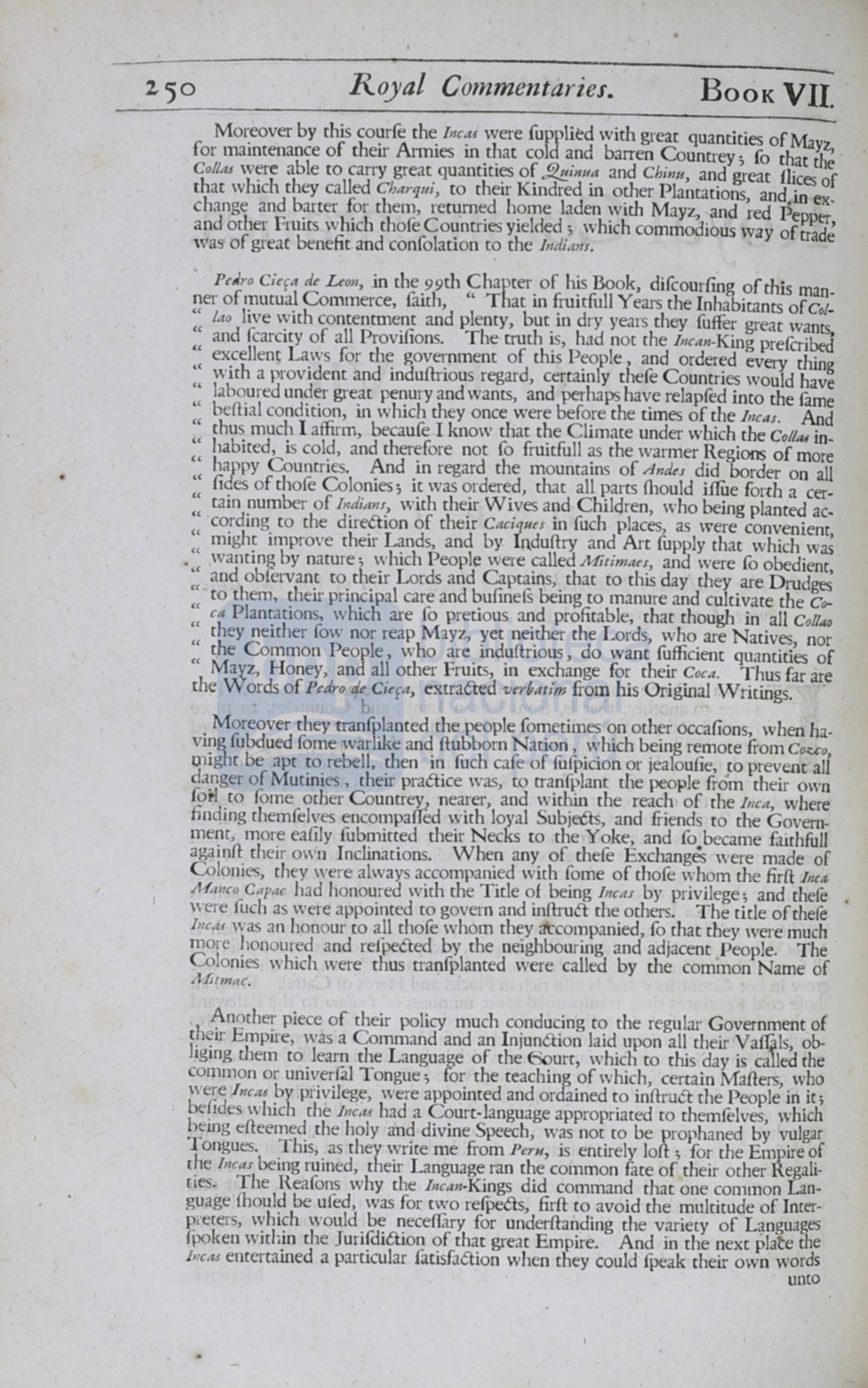

Royal
Commentaries.
BooK
Vil .
Moreover by
this
courfe the
IncM
were fupplied with great quantities of
Mayz,
or maintenance of their Annies
in
that cold and barren Countrey;
fo
that the
CollM
ere able to carry great quantities of
~inua
and
Chinu,
and great
flices of
that which
they
called
Charqui,
to
their
indred
in
other Plantations, and
in
ex–
change and barter
for
them, returned home laden with Mayz, and red
Pepper
and other
ruir
1
hich thofe Countries yielded ; ' hich ommodious way of
trad~
\Va
of great
b
nefit and confolation to the
JndianI.
Pcho
iefa
de
Leon,
in
the
9
9th
Chapter of
his
Book, difcourfing of
this
man-
. ner ofmutual
C
mrnerce, faith,
'' That
in
fruitfull
ears the Inhabitants of
Col–
<<
/ao
live'
ith contentment and plenty,
but
in
dry yea1s they fuffer great wants
" and
fcarcity of all
rovilions. The truth · ,
had
not the
Incan-King
prefcribed
" excellent Lav;-'S for rhe government of this
eople, and ordered every thing
'' with a rovident and indufuious regard, certainly thefe Countries would have
' I
boured un er great enury and wants, and
perha~
have relapfed into the
fame
"
fiial condition, in\ hich they once were before the
times
of the
Incas.
And
'
thu much
I
affirm,
be aufe
I
know chat the
limate under which
the
Coll1U
in–
" habited, · cold, and therefore not fo fruitfull
as
the warmer Regions of
more
" happy
ounrrie . And
in
regard the mountain of
Ande.s
did b
orderon
all
" fides of thofe Colonies; it
i
as
ordered,
that
all parts !hould iifue
for.tha
cer–
" tain number of
Indians,
ith their
Wi
es and Children, who bein
g planted
ac..
cc
cording
to
the dire
ion of their
Caciques
in
fuch places,
a
were convenient,
'' might im r
e their Lands, and by Indu!l:ry and
Art
fu
ply chat
hich
was
. " ' anting y nature; which People!
ere called
Mtimaes,
and were
fo
obedient,
'' and bfervant
co
their Lords and Captains, that to this day they are Drudges
" to them, their principal care and bufinef5 being
to
manure and cultivate the
Co–
,,
ca
Plantation , \
hich
are fo pretious and profitable, that though in all
CoDao
" they neither fm nor reap Mayz, yet neither the Lord , who are
acives, nor
" the Common People,
ho are indufrrious, do want fufficient quantities of
cc
tv!~yz,
Honey, and all other
rui , in exchange
for
their
Coca.
Thus
far are
the Words of
Pedro de Ciefa,
trafud
ve-t'b;itim
from
his
Original
\¥
ritings.
Moreover they tranfplaoced the people fometimes on other occalions, when ha–
ving fubdued fame \ arlik and ftub om
ation, which being remote from
Co:u-o,
01ight be apt to rebelt then in fuch ca e
f
fufpicion or Jealoufie, to prevent all
danger of Mutinie
cheir prattice was,
t
tran plant the
~ople
from their
°"'
n
fo.l
to
fome other
Countre~
nearer, and \ ithin the reach of the
Inca,
where
finding themfelves encompatted ' ich loyal
ubjeCts, and friend
to the Govern–
ment_, more eafily fubmitted their
e
ks
to the
oke, and a.became faithfull
aga inlt their o Yn Inclinations. When any of thefe
xchanges "ere made of
loni
, th
y
were alv ay a companied with Come of chofe \Yhom the firfr
Inca
Manco Capac
had honoured \ ith the
itle of being
Incas
by pri Hege; and thefe
.
were
fu
n
a w reap ointed
co
go em and infuutt the others. The ride of thefe
Incas
wa an h nour
to
all thofe whom they
ompanied, fo that they were much
more h noured and refi ecred by the neighbouring and adjacent People. The
lonies whi h \\ere thus tranfplanced
ere called by the common
ame of
lV.fitmac.
Another piece of their olicy much conducing to the regul r Government of
their Empire,
\\as
a
omrnand and an lnjunCl:ion laid u on all their
Va~l
, ob–
liging them
to
learn the Language of the
urr, which to this day
is
called che
ommon or univerfal Tongue; for the teaching of' hich, certain Mafiers, who
w
re
IncM
by rivilege, were appointed and ordained to infiruet the eople
in
it;
befid which the
JnctU
had a
ourc-lan~age
appropriated to themfel e , which
being efieemed the holy and divine peech, was not to be prophaned by vulgar
ongues.
his, as they write me from
Peru,
is entirely lofi: ; for the Empire
of
rhe
Incas
eing ruined, their
anguage ran the common fate of their other Regali–
ti
. The
eafons why the
lncan·Kings
did command that one common Lan–
guage fhould be ufed was for mo refpe&,
full:
to avoid the m ltitude of Inter–
p1·eter , which ' ould be neceffary for underftanding the variety of Languages
f
po
ken v ithio the
J
urifdiltion of that great Empire. And in the next pla e the
nctU
entertained a particular fatisfaCtion when they could peak their own words
unto














